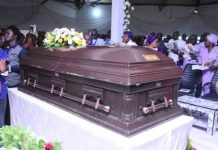Ahmed Ododo of the APC won in 12 of the 21 local government areas, garnering 446,237 votes to emerge the winner in Kogi.
By Mark Mayah
Ahmed Ododo of the All Progressives Congress (APC) was on Sunday returned as the winner of Saturday’s Kogi State governorship election by the Independent National Electoral Commission (INEC), through the returning officer, Johnson Urama.
Mr Urama, who is the deputy vice-chancellor (Academics) of the University of Nigeria, Nsuka, said Mr Ododo polled the highest number of lawful votes in the election and “satisfied the requirements of the law” to be declared as the winner.
But the declaration was swiftly rejected by the opposition, particularly the Social Democratic Party (SDP), which alleged that the election was compromised by the APC-led government and “dubious” INEC officials.
On Tuesday, some angry SDP supporters marched to the INEC headquarters in Abuja and demanded cancellation of the election for alleged fraud. However, allegations of malpractice by losers have become part of elections in Nigeria. The aggrieved have a window to file their petitions for determination, first by a tribunal and finally by the appeal and supreme courts.
Voters
There were 794,500 accredited voters for the 2023 Kogi governorship election, representing 41.3 per cent of registered voters in the state and 43.3 per cent of the 1,833,160 who collected their PVCs before the election.
The aggregate turnout of voters was an increase, though controversial, over what was recorded in the 2019 governorship election and the 2023 presidential election. There were 1.65 million registered voters in the state in 2019, but only 624,514 turned out for accreditation for Saturday’s election, representing a 38 per cent voter turnout.
In the 2023 general elections in the state, voter turnout dropped to 25 per cent. Out of the 1.65 million registered voters, only 476,038 persons voted.
The “improvement” in the turnout of voters last Saturday was despite apprehension over insecurity after pre-election violence involving party supporters. The atmosphere had led to concerns of likely voter apathy and poor turnout on election day.
Observers have, however, pointed at an unusual development in the turnout of voters. While the turnout of voters is generally low across most of the local government areas, the turnout of voters is above average in three local governments in the central senatorial district: Okene, Adavi and Okehi.
These three local governments also accounted for 30.9 per cent of the total votes cast across the state, even though none of them has the highest number of registered voters.
Okene LGA had 141,898 accredited voters during the election, which is a 95 per cent turnout of eligible voters who collected PVCs (149,085).
For Adavi, 103,251 voters were accredited, a turnout of 91.4 per cent when viewed against those who collected their PVCs (113,024).
In Okehi, a total of 57,243 voters were accredited last Saturday, representing 62 per cent of those who collected their PVCs in the local government area.
Apart from the three, no other local government had up to 40 per cent turnout in the state.
Dekina, which has the highest number of registered voters (187,881), recorded a PVC collection of 184,264. Its voter turnout was 32 per cent, having recorded 60,588 accredited voters.
Ankpa, the second largest voting bloc in the state, has 180,095 registered voters with a PVC collection of 164,514. The total number of accredited voters on election day was 57,650, a 35 per cent turn when viewed against the number of PVCs collected.
The three local governments with the controversial turnout rates were overwhelmingly won by the ruling APC, amid allegations of fraud.
Kogi AD
Although INEC had on receiving complaints on election day, promised to investigate the irregularities complained about in the local governments, the opposition parties have alleged that INEC failed to carry out any meaningful probe of the allegations.
Mr Ododo’s main opponents were Dino Melaye of the Peoples Democratic Party (PDP), Murtala Ajaka of the Social Democratic Party (SDP) and Leke Abejide of the African Democratic Congress. There were 14 others, including Olayinka Braimoh of the Action Alliance.
The SDP candidate, Mr Ajaka, won eight of the nine local government areas in the Kogi East district where he comes from. He had minimal impact elsewhere as he did not win any of the 12 local government areas outside his zone.
The APC candidate, Mr Ododo, also won the five local government areas in his home Kogi Central district. However, he upset Mr Melaye of the PDP by also winning six of the seven local government areas in Kogi West, and one local government area in Mr Ajaka’s Kogi East. In all, Mr Ododo won in 12 of the 21 local government areas, garnering a total vote of 446,237 votes to return ahead of Mr Ajaka, who scored 259,052 votes.
Mr Melaye won his polling unit with a wide margin but lost his ward and local government area. His total share of the votes was 46,362.
Mr Abejide of the ADC, who polled 21,819 votes overall to return fourth, won his Yagba East Local Government Area.
The APC’s winning strategy was to take “maximum votes” from the Central district and grab the West district to neutralise Mr Ododo’s expected votes from the East district.
The Kogi East district, constituted largely by the Igala ethnic group, has almost half of the state’s population. Mr Ajaka held absolute sway over the local governments where the Igalas are the majority in the district, losing only Ibaji, whose population is not majorly of Igala ethnicity.
This underscores the influence that ethnicity had on the election.
The Ebira ethnic group of Mr Ododo and outgoing Governor Bello dominate Kogi Central, with only Ogori Magongo LGA not being Ebira.
Also, the three candidates from Kogi West – Messrs Abejide, Braimoh and Melaye – did not get significant votes outside the district.
This ethnic factor accounted for the tension and violence that attended the campaigns.
Violence
Although there was the fear that the election would be violent with ballot box snatching and sporadic shooting by hoodlums as witnessed in 2019, the 2023 election was surprisingly peaceful.
About 40,000 security personnel were on the ground for the election from the police, army, NSCDC and other security agencies.
Despite the huge security presence, hoodlums attempted to steal ballot boxes or disrupt the process. The Centre for Democracy and Development (CDD) in its preliminary report on the election, noted that electoral violence was reported in Dekina LGA, specifically in Agala Ogane PU, Anyigba town. It said a thug was reportedly shot by military officials while attempting to snatch a ballot box. The report said there was a similar attempt in Ganaja PU, Ajaokuta LGA where the LGA chair was apprehended by voters.
There were delightful reports of other such attempts to disrupt polling being foiled by vigilant local youths or security personnel.
Footage circulated on social media showed some hoodlums being arrested in police uniforms while attempting to compromise the election. However, the commissioner of police in the state, Bertrand Onuoha, when contacted, said he had not been briefed on the incident.
The candidates have praised the performance of security agencies in curbing violence and disruptions during the election. Mr Melaye and the governor-elect agreed that security operatives helped in ensuring sanity during the election.
Kennedy Adebayo, a journalist who covered the election, noted that the security operatives acted professionally to the extent that the ruling APC raised the alarm that its members were being arrested by them.
“This is a break from the past where we see the ruling party using the security agencies to harass the opposition,” he said. “We observed that members of the ruling party were also arrested for various infractions, sending a clear message that nobody would be spared by the agencies. It helped us achieve the sanity we experienced during the election.”
Irregularities and final results
The reports of forged results uncovered in nine of the 10 wards in Ogori Magongo LGA confirmed the desperation of politicians and the fallibility of electoral officers to inducement.
Local and international observers reported widespread voter inducement and vote trading. For example, CDD reported cases of vote buying in PUs 004, 038 and 039 in Ward A of Lokoja LGA.
In some places, the practice was discreet but in others, those involved cared less who was watching.
Protest
While the results were being collated, the SDP agent, David Ehimoni, submitted two petitions to the INEC, urging the electoral body to stop the exercise until it has investigated the reported cases from Ogori Magongo and other parts of Kogi Central district.
But the returning officer said INEC would look at the complaints but the process would go on.
After the winner was announced, the SDP and PDP described the election as a fraud. Supporters of the SDP later took their protest to the streets of Abuja. But only the pronouncement of a court can change what has been declared as the election results.
Yiaga Africa, which deployed observers and the Process and Results Verification for Transparency methodology to observe the election, said the results reflected the votes at the polling units.
Yiaga drew its conclusion from a pre-election prediction of the trend of the election and voter behaviour.
Maliki Idris, the Executive Director of the Centre for Human Rights and Conflict Resolution, who also observed the election, concluded that the protest was common to politicians who lose elections.
“When they win, they don’t protest,” he said. He said although there were issues for INEC to deal with in future elections, its decision to declare the winner before a rerun in Ogori Magongo was backed by the principle of margin of lead provided for in the Electoral Act.
According to Mr Idris, the refusal of politicians to play according to the rules remains the problem with elections in Nigeria. He said INEC as the umpire did all that was needed to hold a successful election, but malpractice by politicians continued to undermine the process as it played out in the Kogi election.
“One thing we can say is that the election was largely peaceful even though we had issues in some areas. We are all in agreement that this one is better than the previous election where we witnessed shooting and killing of people,” Mr Idris said.
Unless his victory is overturned in court, Mr Ododo will take over from Mr Bello and govern Kogi on the APC platform for the next four years.





